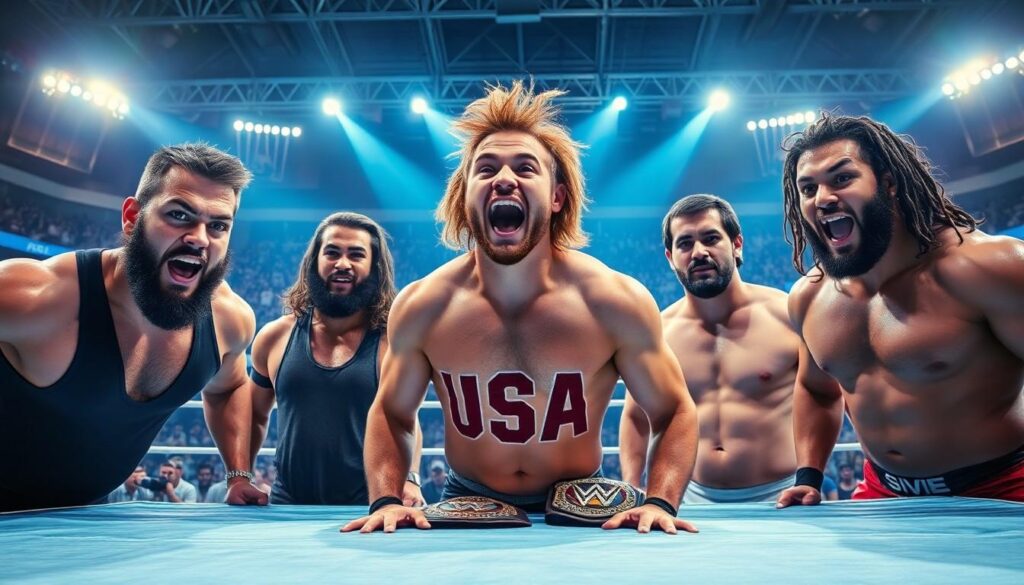Looking to create a wrestling team that leaves a lasting impression? A powerful group name is your first step toward dominating the ring. Whether you’re forming a professional faction, starting a wrestling club, or just brainstorming for fun, the perfect name sets the tone for your wrestling identity.
We’ve compiled an extensive collection of wrestling group names that pack a punch. From intimidating and fierce to clever and creative, our list covers every style you might need. These aren’t just random suggestions—they’re carefully selected options that will help your team stand out from the competition and build a memorable brand in the wrestling industry.
Popular Wrestling Group Names in WWE History
WWE has produced some of the most iconic wrestling factions that have left an indelible mark on professional wrestling history. These legendary groups combined charisma, in-ring talent, and compelling storylines to captivate audiences worldwide. Let’s explore the most influential wrestling groups that have shaped WWE’s industry over the decades.
The New Day stands as one of the most successful and beloved factions in recent WWE history. Comprising Kofi Kingston, Big E, and Xavier Woods, this trio transformed from a struggling gospel-inspired group into an entertaining powerhouse known for their positive energy and record-breaking championship reigns.
D-Generation X revolutionized WWE during the Attitude Era with their rebellious antics and catchphrase “Suck it!” The original lineup featured Shawn Michaels and Triple H, later expanding to include Chyna, Road Dogg, Billy Gunn, and X-Pac, cementing their status as one of wrestling’s most influential factions.
The Shield debuted in 2012 as a dominant force featuring Roman Reigns, Seth Rollins, and Dean Ambrose (now Jon Moxley). Their tactical gear, entrance through the crowd, and triple powerbomb finisher made them instant sensations before each member evolved into main event singles stars.
Evolution represented wrestling’s past, present, and future with Ric Flair, Triple H, Batista, and Randy Orton forming an elite stable that dominated Raw in the early 2000s. This blueprint for success helped launch Batista and Orton into superstardom.
The Four Horsemen originated in NWA/WCW but significantly influenced WWE’s faction industry. With various incarnations typically led by Ric Flair, this group established the template for the sophisticated, championship-hoarding heel faction that many WWE groups would later emulate.
The nWo (New Industry Order) began in WCW but eventually made its way to WWE with founding members Hulk Hogan, Scott Hall, and Kevin Nash. Their black and white aesthetic and “too sweet” hand gesture continue to influence wrestling culture today.
The Wyatt Family brought a unique horror-inspired presentation to WWE, with Bray Wyatt leading disciples like Luke Harper, Erick Rowan, and Braun Strowman. Their eerie entrance with lanterns and cryptic promos created an atmosphere unlike any other faction.
The Hart Foundation evolved from a tag team to a powerful anti-American stable in the late 1990s. Led by Bret “The Hitman” Hart, this Canadian group included Owen Hart, British Bulldog, Jim Neidhart, and Brian Pillman, creating compelling national rivalries.
The Nation of Domination launched The Rock’s career and addressed serious social issues while featuring talented performers like Faarooq, D’Lo Brown, Mark Henry, and Kama Mustafa (The Godfather). Their cultural impact remains important in wrestling history.
The Bloodline represents WWE’s current dominant faction, centered around Roman Reigns as the “Tribal Chief” and featuring members of the legendary Anoa’i family. Their ongoing saga continues to be one of WWE’s most compelling storylines in recent years.
Iconic Wrestling Factions That Dominated the Ring

The New Industry Order (nWo)
The New Industry Order, commonly known as nWo, revolutionized professional wrestling when it formed in 1996 as a rebellious faction in Industry Championship Wrestling (WCW). Founded by the iconic trio of “Hollywood” Hulk Hogan, Kevin Nash, and Scott Hall, this group fundamentally altered wrestling’s industry during the industry’s hottest period. Their black and white attire became instantly recognizable as they portrayed an invading force taking over WCW programming. Thanks to the nWo’s popularity, WCW surpassed WWE (then WWF) as the number one wrestling company in the United States during the famous “Monday Night Wars” era of the mid to late 1990s. The faction later expanded to include other notable wrestlers such as Randy Savage, Konnan, and even WCW executive Eric Bischoff, creating a powerful stable that dominated storylines for years.
The Four Horsemen
The Four Horsemen stand as one of wrestling’s most influential and prestigious factions, operating primarily in the NWA and WCW from the 1980s through the early 1990s. Originally composed of Ric Flair, Arn Anderson, Ole Anderson, and Tully Blanchard with James J. Dillon as their manager, this elite group established the blueprint for heel stables in professional wrestling. Their sophisticated appearance in formal suits, accompanied by beautiful women, and their technical prowess in the ring set them apart from other groups of the era. Throughout their impressive 13-year run, the stable saw multiple iterations, with Ric Flair and Arn Anderson remaining as constants while other notable members included Lex Luger, Barry Windham, Sting, Sid Vicious, and Chris Benoit. The Four Horsemen were involved in legendary feuds with stars like Dusty Rhodes, the Road Warriors, and the Steiner Brothers, and they’re credited with introducing the innovative War Games match concept. Their lasting influence can be seen in later factions like Evolution, the Corporation, and ironically, their rivals the nWo.
Tag Team Names That Left a Lasting Legacy

Some tag teams have created such powerful legacies that their names alone evoke memories of iconic matches and unforgettable moments in professional wrestling history.
The Road Warriors/Legion of Doom
The Road Warriors, also known as the Legion of Doom, stand as one of the most influential tag teams in professional wrestling history. Formed in 1983 in Georgia Championship Wrestling, the duo of Road Warrior Hawk (Michael Hegstrand) and Road Warrior Animal (Joseph Laurinaitis) were paired together by Ole Anderson, creating what would become a legendary partnership. Their name “Legion of Doom” was actually borrowed from the Super Friends cartoon, as Animal later revealed in their documentary DVD set.
Known for their intimidating presence, the Road Warriors developed a fearsome reputation with their unique spiked shoulder pads, face paint, and powerhouse wrestling style. They quickly dominated the tag team scene, capturing multiple NWA National Tag Team Championships and gaining notoriety for their stiff, hard-hitting matches that legitimate scared opponents.
Paul Ellering served as their manager, helping form the original Legion of Doom stable in the NWA’s Georgia Championship Wrestling territory. Upon joining the Industry Wrestling Federation (now WWE) in 1990, they exclusively used the Legion of Doom name. Their career continued until Hawk’s passing in 2003, after which Animal briefly teamed with Heidenreich, capturing the WWE Tag Team Championship before his WWE release.
The team’s contributions to professional wrestling were formally recognized in 2011 when the Road Warriors, alongside Paul Ellering, were inducted into the WWE Hall of Fame.
The Hardy Boyz
The Hardy Boyz revolutionized tag team wrestling with their death-defying aerial maneuvers and unique charisma. Comprised of brothers Matt and Jeff Hardy, this ever-changing duo became foundational figures in WWE’s Attitude Era during the late 1990s and early 2000s.
Famous for their willingness to put their bodies on the line, the Hardys pioneered and popularized Tables, Ladders, and Chairs (TLC) matches, creating some of wrestling’s most memorable moments. Their high-flying style contrasted with traditional tag team wrestling, bringing a fresh approach that captivated audiences worldwide.
Throughout their careers, the brothers accumulated an impressive collection of championships across multiple promotions, including multiple WWE Tag Team Championships and TNA Industry Tag Team Championships. Their innovative approach to tag team competition influenced countless wrestlers who came after them.
The Hardy Boyz continue to make an impact in professional wrestling, with both brothers remaining active competitors across various promotions. Their legacy as one of the most exciting and influential tag teams in wrestling history remains firmly established, having forever changed how audiences view tag team action.
Wrestling Stables That Revolutionized the Industry

D-Generation X
D-Generation X (DX) stands as one of the most influential wrestling stables in WWE history, playing a pivotal role in launching the company’s Attitude Era. Founded by Triple H and Shawn Michaels in the late 1990s, DX became synonymous with rebellion and anti-authority sentiment that defined a generation of wrestling. Their crude humor, rule-breaking antics, and sophomoric pranks earned them the reputation as “the most controversial group in WWF/E history.”
The faction’s cultural impact extended far beyond the wrestling ring, with their crossed “X” logo becoming an iconic symbol embraced by fans worldwide. Their infamous “invasion” of WWE headquarters during their feud with Vince McMahon perfectly showcased their disregard for authority while cementing their rebellious legacy. DX wasn’t just entertaining—they were revolutionary, helping transform the wrestling industry alongside other major stars like Stone Cold Steve Austin and The Rock. Today, several former members remain influential in WWE operations, with Triple H now serving as the company’s chief content officer and head of creative.
The Shield
The Shield emerged in 2012 as a dominant force that would forever change the modern wrestling industry. Comprised of Dean Ambrose, Roman Reigns, and Seth Rollins, this trio debuted as enforcers aligned with CM Punk before evolving into their own powerhouse faction. Their “Hounds of Justice” gimmick positioned them as vigilantes determined to address perceived injustices in WWE, connecting strongly with audiences through their cohesive unit presentation and exceptional in-ring performances.
Wrestling fans witnessed The Shield’s influence extend far beyond their time as a group, as they played a crucial role in WWE’s transition from the Attitude Era to the modern era. Their intense matches and compelling storylines helped establish what would become known as WWE’s “New Era.” Each member later achieved remarkable individual success—Roman Reigns and Seth Rollins have become cornerstones of WWE programming, while Dean Ambrose (now Jon Moxley in AEW) has flourished outside the company. The Shield’s legacy continues through their athletic, hard-hitting style that raised the bar for faction wrestling and launched three of the most successful careers in modern professional wrestling history.
International Wrestling Groups With Cult Followings

Wrestling’s global reach has created some of the most passionate fan bases outside of mainstream American promotions. These international stables have developed dedicated followings that transcend geographical boundaries.
Bullet Club
Bullet Club revolutionized the international wrestling scene after its formation in New Japan Pro-Wrestling (NJPW) in 2013. Founded by Prince Devitt (now known as Finn Bálor in WWE), Bad Luck Fale, and Tama Tonga, this stable quickly captured the imagination of wrestling fans worldwide. Their unique blend of wrestling styles and charismatic personalities created an immediate connection with audiences across multiple continents.
The group’s roster has featured some of wrestling’s biggest stars throughout its history, including AJ Styles, Kenny Omega, and The Young Bucks, who all played crucial roles in expanding the stable’s global footprint. Bullet Club merchandise has become a phenomenon in itself, with their iconic skull logo appearing on t-shirts and gear worn by fans far beyond Japan’s borders.
What makes Bullet Club truly special is how they’ve maintained relevance and popularity even though many member changes over the years. Their influence extends beyond NJPW, affecting promotions worldwide and creating a blueprint for successful international wrestling factions.
Los Ingobernables de Japon
Los Ingobernables de Japon (LIJ) emerged in 2015 under the leadership of the charismatic Tetsuya Naito, quickly establishing itself as one of New Japan Pro-Wrestling’s most compelling factions. The group’s rebellious attitude and anti-authority stance have resonated deeply with fans seeking alternatives to traditional wrestling narratives.
Key members like SANADA, BUSHI, and Hiromu Takahashi have contributed to the group’s distinct identity through their unique in-ring styles and compelling character work. LIJ’s aesthetic is immediately recognizable, featuring black and white attire and memorable entrance themes that have become iconic elements of their presentation.
The stable’s cultural impact extends beyond their in-ring performances, with their merchandise becoming highly sought after by collectors and casual fans alike. Their ability to connect with audiences through a combination of exceptional wrestling and compelling storytelling has cemented LIJ as one of the most influential international wrestling groups of the modern era.
Women’s Wrestling Factions Making History

Female wrestling groups have dramatically transformed the industry, breaking barriers and creating new opportunities for women in professional wrestling. Let’s explore some of the most influential women’s factions that have made wrestling history.
The Four Horsewomen
The Four Horsewomen stand as one of the most influential collectives in women’s wrestling history, even though not being a traditional faction. Comprised of Sasha Banks, Charlotte Flair, Becky Lynch, and Bayley, these four extraordinary talents emerged from NXT to revolutionize WWE’s main roster. Their exceptional in-ring abilities and compelling characters became the cornerstone of WWE’s Women’s Revolution. Each member has captured multiple championships and headlined major events, including WrestleMania, proving that women’s wrestling can be just as compelling and commercially successful as men’s. Their collective impact transformed women’s wrestling from a sideshow attraction to a main event spectacle, forever changing how female performers are perceived in the industry.
The Riott Squad
The Riott Squad burst onto the scene in 2017, bringing a chaotic energy to WWE’s women’s division. Consisting of Ruby Riott, Liv Morgan, and Sarah Logan, this disruptive trio debuted on SmackDown with an aggressive style that immediately set them apart. Their unconventional appearance and unpredictable tactics created compelling television as they targeted established stars across both brands. WWE formed the group as part of their ongoing effort to strengthen and add depth to the women’s division during a critical period of growth. The faction remained active until 2019, providing all three members with valuable television exposure and storyline opportunities. Though their run lasted only two years, The Riott Squad helped diversify the presentation of women’s wrestling by offering an alternative to the more polished, mainstream female characters typically featured on WWE programming.
Team PCB
Team PCB emerged as a pivotal faction during WWE’s 2015 Women’s Revolution, featuring the powerhouse trio of Paige, Charlotte Flair, and Becky Lynch. This group served as the perfect vehicle to introduce future stars Flair and Lynch to the main roster audience after their successful NXT runs. Their formation initiated several important feuds that would eventually help reshape the entire women’s division. Team PCB’s storylines directly contributed to elevating women’s wrestling from brief, inconsequential matches to substantial, story-driven competitions that fans genuinely invested in.
Team BAD and Team Bella
Team BAD (consisting of Sasha Banks, Naomi, and Tamina) and Team Bella (featuring The Bella Twins and Alicia Fox) emerged as key players during WWE’s faction-based women’s division storylines. These groups participated in a series of interconnected feuds that significantly increased screen time for women wrestlers across WWE programming. Though neither faction maintained the lasting impact of Team PCB or The Four Horsewomen, they played essential roles in the transitional period that led to greater opportunities for female performers. The competitive ever-changing between these rival factions helped demonstrate the depth of talent available in WWE’s women’s division, proving that multiple compelling storylines featuring female wrestlers could run simultaneously.
How to Create Memorable Wrestling Group Names

Creating a wrestling group name that resonates with fans and reflects your team’s identity requires careful consideration. We’ve compiled expert strategies to help you develop a name that will make your wrestling faction stand out in the ring.
Thematic Consistency
Selecting a theme that aligns with your group’s personality, wrestling style, or origin story is crucial for brand cohesion. Your theme should immediately communicate who you are to the audience.
- Urban Uprising works perfectly for a team with street-smart personas or urban backgrounds
- Toxic Titans conveys a dangerous, heel-oriented team that poisons their opponents’ chances
- Galactic Guardians suits a futuristic gimmick or a team with cosmic-inspired characters
Use of Powerful Words
Incorporating strong, impactful vocabulary instantly elevates your wrestling group’s perceived dominance in the ring.
- Bone Crushers immediately signals to fans that your team brings devastating power
- Demolition creates an image of a team that systematically takes apart opponents
- Cataclysm Crew suggests your faction brings catastrophic consequences to anyone who faces you
Alliteration and Rhyme
Employing literary techniques makes your wrestling group name more catchy and memorable for fans to chant.
- Thunderbolt Titans combines alliteration with powerful imagery that sticks in viewers’ minds
- Neon Nemesis creates a distinctive sound pattern while suggesting a visually striking team
- Street Savages rolls off the tongue easily while establishing a gritty, uncompromising character
Historical and Cultural References
Drawing inspiration from history, mythology, or pop culture gives your wrestling group instant recognizability and depth.
- Spartans immediately evokes the disciplined, fearless warriors of ancient Greece
- Gladiators connects your team to the legendary combatants of Roman arenas
- Brothers of Destruction follows the tradition of iconic teams like WWE’s Kane and Undertaker
Unique Combinations
Merging unexpected elements creates distinctive wrestling group names that stand out from the competition.
- Quantum Quake blends scientific terminology with destructive power
- Phantom Fury combines supernatural elements with intense aggression
- Apocalypse Ascendants merges end-times imagery with a sense of rising domination
Learn From Iconic Duos and Teams
Studying successful wrestling teams provides valuable insights into effective naming conventions.
- Road Warriors (Legion of Doom) established dominance with a straightforward, intimidating name
- Hardy Boyz demonstrated how simplicity can work perfectly when it aligns with the team’s identity
When brainstorming your wrestling group name, consider how it will sound when announced, how easily fans can chant it, and how well it complements your team’s visual presentation. The perfect name balances memorability with authenticity, creating an instant connection with your audience while establishing your faction’s place in wrestling history.
The Impact of Wrestling Group Names on Merchandising

Brand Recognition and Identity
Wrestling group names serve as powerful brand identifiers that significantly impact merchandising success. Factions like “Aces & Eights” in Impact Wrestling demonstrate how a strong name can dominate a promotion for nearly a year, making their merchandise instantly recognizable to fans. The name becomes synonymous with the group’s persona, creating a visual and emotional connection that translates directly to merchandise appeal. Effective branding through memorable names helps wrestling groups stand out in a crowded marketplace, giving fans clear identifiers to rally behind. Brand recognition built through consistent use of the group name across various platforms eventually drives merchandise sales and fan loyalty.
Merchandise Appeal and Design Elements
Catchy and unique group names naturally enhance merchandise appeal by providing distinctive design elements. “Paparazzi Productions,” led by Alex Shelley in Impact Wrestling, showcased how a creative concept can be transformed into bold, eye-catching t-shirt designs that resonated with fans. Wrestling groups with visually evocative names offer merchandise designers rich creative territory for developing logos, color schemes, and imagery. Their distinctive branding elements often become iconic symbols that fans immediately associate with their favorite factions. Creative names also allow for more versatile merchandise options, from apparel to accessories, expanding revenue opportunities for wrestling promotions.
Fan Engagement and Community Building
Group names that connect with fans emotionally drive merchandise purchases as expressions of allegiance and community membership. Fans frequently buy merchandise featuring groups like “The Hardys” to demonstrate their support and feel part of a larger wrestling community. Purchase decisions often reflect fan identification with the values or attitudes represented by exact wrestling factions. Wearing merchandise featuring popular group names allows fans to recognize fellow supporters in public, creating spontaneous connections. Strong faction names help this tribal aspect of wrestling fandom, transforming merchandise from simple products into symbols of community belonging.
Marketing Strategy Implementation
The success of wrestling group merchandise depends heavily on strategic marketing across multiple channels. Impact Wrestling effectively sells faction-related items both at live events and through online platforms, maximizing accessibility for fans. Promotions often use merchandise featuring popular group names as centerpieces of their retail strategy. Limited edition releases for iconic factions create urgency and exclusivity that drive sales spikes. Strategic placement of merchandise during television broadcasts, particularly when featuring the named groups, creates direct marketing opportunities that connect viewers to available products. Marketing campaigns that highlight the stories and personalities behind the group names forge stronger connections between fans and merchandise.
Conclusion
Choosing the perfect wrestling group name can make all the difference in building a memorable brand that resonates with fans. From legendary factions like the nWo and The Four Horsemen to modern powerhouses like The Shield and Bullet Club these names have helped define wrestling history.
Whether you’re forming a tag team or assembling a larger stable the right name will enhance your identity both in the ring and on merchandise. We’ve seen how women’s factions like The Four Horsewomen have revolutionized the industry while international groups have created global followings.
Remember that the most effective names reflect your team’s unique character and create an instant connection with audiences. With the strategies we’ve shared you’ll be well-equipped to create a name that stands the test of time and earns its place in wrestling lore.
Frequently Asked Questions
What is the importance of a strong wrestling group name?
A strong wrestling group name establishes team identity, enhances presence in the ring, and creates a memorable brand. It helps teams stand out in the wrestling industry and connects with fans on an emotional level. An effective name can also significantly impact merchandising opportunities and fan loyalty, serving as a powerful brand identifier that resonates throughout a faction’s career.
What are some of the most iconic wrestling factions in WWE history?
The most iconic WWE factions include The New Day, D-Generation X, The Shield, Evolution, The Four Horsemen, nWo, The Wyatt Family, The Hart Foundation, The Nation of Domination, and The Bloodline. These groups have shaped professional wrestling through their unique characters, memorable storylines, and significant cultural impact, with many becoming household names beyond the wrestling world.
How did the New World Order (nWo) revolutionize professional wrestling?
The nWo revolutionized wrestling in 1996 with its rebellious anti-establishment image. The faction helped WCW surpass WWE during the “Monday Night Wars” by introducing a realistic, edgy storyline that blurred the lines between scripted and real. Their black and white merchandise became iconic, and their “invasion” angle created a blueprint for heel stables that continues to influence wrestling storytelling today.
What impact did The Four Horsemen have on wrestling?
The Four Horsemen set the standard for heel stables from the 1980s to early 1990s. Known for their sophisticated style, technical wrestling skills, and prestigious presentation, they created the template for what a dominant faction should be. Their influence extends to numerous future groups, and their legendary feuds and championship dominance cemented them as one of wrestling’s most important factions.
Who were The Road Warriors and why are they significant?
The Road Warriors (Legion of Doom), formed in 1983, revolutionized tag team wrestling with their intimidating presence, face paint, and hard-hitting style. Hawk and Animal captured championships across multiple promotions and pioneered the powerhouse tag team archetype. Their influence is seen in countless teams that followed, and they were inducted into the WWE Hall of Fame in 2011, cementing their legendary status.
How did The Hardy Boyz change tag team wrestling?
The Hardy Boyz (Matt and Jeff Hardy) transformed tag team wrestling in the late 1990s with their innovative high-flying style. They popularized Tables, Ladders, and Chairs (TLC) matches and took aerial maneuvers to new heights. Their willingness to take physical risks created a new standard for exciting tag team action that influenced generations of performers who followed them.
What made D-Generation X culturally significant?
D-Generation X (DX) defined WWE’s Attitude Era with their rebellious, anti-authority antics and crude humor. Founded by Triple H and Shawn Michaels, they captured the defiant spirit of the late 1990s with catchphrases like “Suck it!” and their iconic “X” gesture. Their boundary-pushing content helped WWE win the ratings war against WCW and established a new, edgier direction for mainstream wrestling.
Why is The Shield considered one of WWE’s most successful modern factions?
The Shield (Dean Ambrose, Roman Reigns, and Seth Rollins) debuted in 2012 and quickly became known for their tactical excellence and cohesive unit presentation. Their distinctive entrance through the crowd, coordinated triple powerbomb, and strong in-ring chemistry set them apart. Each member went on to achieve major individual success, demonstrating the group’s impact on WWE’s modern era.
What are some notable international wrestling factions?
Bullet Club and Los Ingobernables de Japon (LIJ) stand out as influential international factions. Bullet Club, formed in 2013 in NJPW, gained global popularity through members like AJ Styles and Kenny Omega. LIJ, established in 2015 under Tetsuya Naito, developed a cult following through its rebellious identity. Both groups transcended their Japanese origins to build passionate worldwide fan bases.
How have women’s wrestling factions transformed the industry?
Women’s factions like The Four Horsewomen (Banks, Flair, Lynch, Bayley) revolutionized women’s wrestling by proving female performers could headline major events. Groups like The Riott Squad, Team PCB, Team BAD, and Team Bella showcased depth of talent and character development. These factions played crucial roles in WWE’s Women’s Evolution, elevating female wrestling from sideshows to main event attractions.
What strategies should be used when creating a wrestling group name?
When creating a wrestling group name, focus on thematic consistency, powerful words, and literary techniques like alliteration. The name should reflect your team’s identity and resonate with fans. Draw inspiration from history, pop culture, and successful wrestling groups. Ensure the name is memorable, easy to chant, and works well on merchandise to establish your faction’s place in wrestling history.
How do wrestling group names impact merchandising success?
Wrestling group names significantly impact merchandising by serving as brand identifiers that create emotional connections with fans. Strong names like nWo and Bullet Club translate effectively to shirts, accessories, and collectibles. Strategic marketing of faction merchandise through limited edition releases and cross-promotional opportunities can drive sales and build community among fans who proudly display their allegiance.







